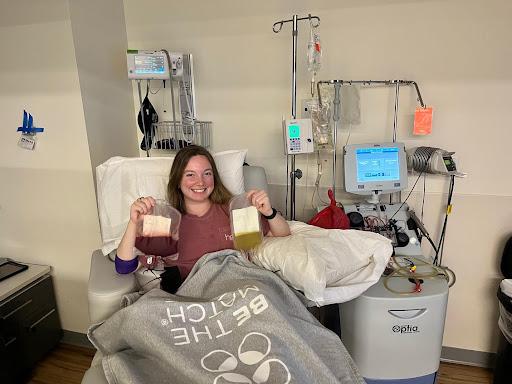Emily Hathcock ‘23, did not know what to expect upon receiving a phone call from Minneapolis, Minnesota. After not simply dismissing it as a spam call, Hathcock soon realized she was a match. Being selected as a bone marrow match is an extremely rare but rewarding process, and it came to be reality for Hathcock.
Hathcock heard about the Be the Match process through an organization called HOSA – Future Health Professionals.
HOSA is an international organization that allows students to gain access to programs and opportunities for those interested in careers such as medicine, pharmacy, density, psychology, etc. HOSA provides many opportunities for students through a unique combination of conferences and other hands-on experiences that help foster leadership development, education, networking and recognition.
Wofford student Skyler Hays ‘25 currently serves as the South Carolina President of HOSA.
“HOSA is on the forefront of providing knowledgeable future health professionals in response to our growing international need for healthcare professionals,” Hays said.
Every two years, HOSA picks a national service project to support and make a positive impact in the community. In 2020, this project was Be the Match.
After Hathcock was exposed to this project through HOSA, she felt led to request a swab collection kit. This process consisted of merely swapping and collecting samples from her cheeks, then sending it off.
Hathcock’s mom has been on the Be the Match registry for over 20 years.
“Honestly, after learning about Be the Match and their mission, I couldn’t see myself not joining the registry,” Hathcock said.
Being selected to become a match is very rare, but Hathcock joined the list anyways, simply out of a desire to provide some hope for people on the other end. The donation process itself is not complicated. Hathcock added how she was maybe called three times before her trip to Seattle, Washington, where the donation actually took place.
“Surprisingly, for the first two calls – I was in Milliken” mentioned Hathcock.
Prior to the actual donation, Hathcock went through several blood work appointments and had to have a physical done immediately before donation. She was paired with a specialist who helped arrange all these preliminary appointments, schedule flights, arrange transportation and secure lodging.
Reflecting on the donation day, Hathcock remarked how smooth the process was and how incredibly hospitable the staff at Be the Match were. Hathcock was in the chair for around seven hours, during which approximately four million stem cells were collected.
Hathcock’s match was then able to receive those around Christmas time. While she has not been able to have direct contact with her match, Hathcock has been able to communicate with them via anonymous letters.
“While it seems simple on the outside, these cells are giving someone hope and more moments to hold onto their family,” Hathcock said. “That is why I said yes. There was not one moment of hesitation through this entire process. All I could say is, if you asked me if I would do this again, I would.”






























